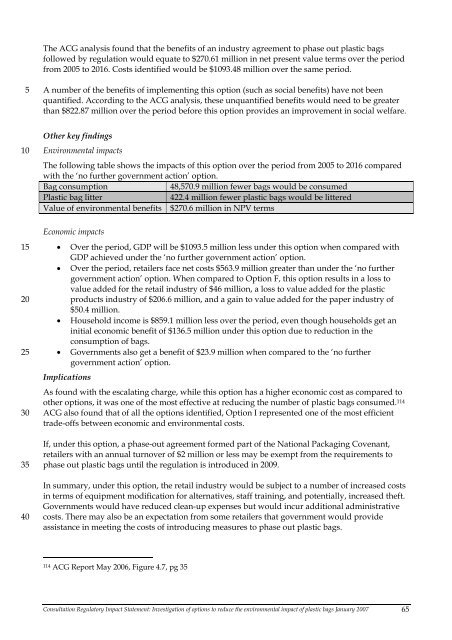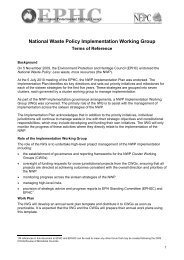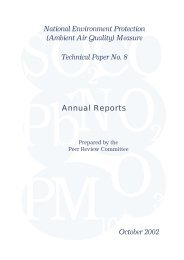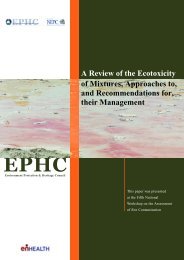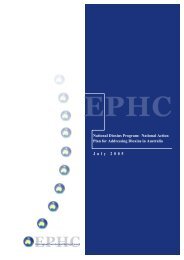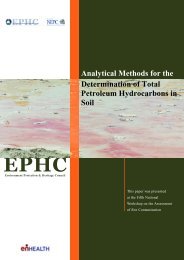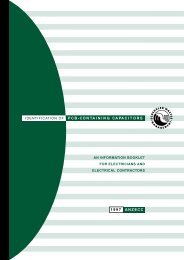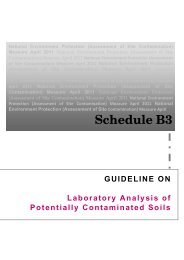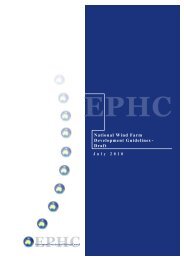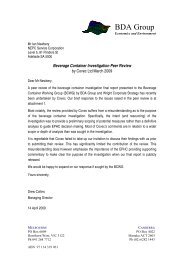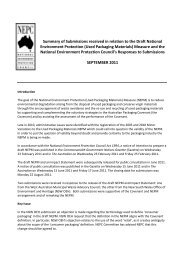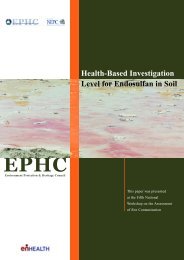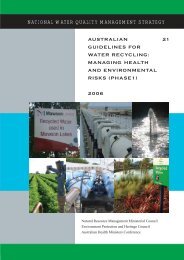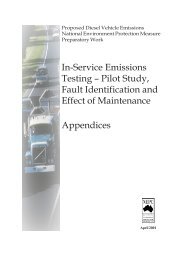Plastic Bags - COAG Standing Council on Environment and Water
Plastic Bags - COAG Standing Council on Environment and Water
Plastic Bags - COAG Standing Council on Environment and Water
You also want an ePaper? Increase the reach of your titles
YUMPU automatically turns print PDFs into web optimized ePapers that Google loves.
The ACG analysis found that the benefits of an industry agreement to phase out plastic bags<br />
followed by regulati<strong>on</strong> would equate to $270.61 milli<strong>on</strong> in net present value terms over the period<br />
from 2005 to 2016. Costs identified would be $1093.48 milli<strong>on</strong> over the same period.<br />
5<br />
A number of the benefits of implementing this opti<strong>on</strong> (such as social benefits) have not been<br />
quantified. According to the ACG analysis, these unquantified benefits would need to be greater<br />
than $822.87 milli<strong>on</strong> over the period before this opti<strong>on</strong> provides an improvement in social welfare.<br />
10<br />
Other key findings<br />
Envir<strong>on</strong>mental impacts<br />
The following table shows the impacts of this opti<strong>on</strong> over the period from 2005 to 2016 compared<br />
with the ‘no further government acti<strong>on</strong>’ opti<strong>on</strong>.<br />
Bag c<strong>on</strong>sumpti<strong>on</strong><br />
48,570.9 milli<strong>on</strong> fewer bags would be c<strong>on</strong>sumed<br />
<str<strong>on</strong>g>Plastic</str<strong>on</strong>g> bag litter<br />
422.4 milli<strong>on</strong> fewer plastic bags would be littered<br />
Value of envir<strong>on</strong>mental benefits $270.6 milli<strong>on</strong> in NPV terms<br />
Ec<strong>on</strong>omic impacts<br />
15<br />
20<br />
25<br />
30<br />
35<br />
40<br />
• Over the period, GDP will be $1093.5 milli<strong>on</strong> less under this opti<strong>on</strong> when compared with<br />
GDP achieved under the ‘no further government acti<strong>on</strong>’ opti<strong>on</strong>.<br />
• Over the period, retailers face net costs $563.9 milli<strong>on</strong> greater than under the ‘no further<br />
government acti<strong>on</strong>’ opti<strong>on</strong>. When compared to Opti<strong>on</strong> F, this opti<strong>on</strong> results in a loss to<br />
value added for the retail industry of $46 milli<strong>on</strong>, a loss to value added for the plastic<br />
products industry of $206.6 milli<strong>on</strong>, <strong>and</strong> a gain to value added for the paper industry of<br />
$50.4 milli<strong>on</strong>.<br />
• Household income is $859.1 milli<strong>on</strong> less over the period, even though households get an<br />
initial ec<strong>on</strong>omic benefit of $136.5 milli<strong>on</strong> under this opti<strong>on</strong> due to reducti<strong>on</strong> in the<br />
c<strong>on</strong>sumpti<strong>on</strong> of bags.<br />
• Governments also get a benefit of $23.9 milli<strong>on</strong> when compared to the ‘no further<br />
government acti<strong>on</strong>’ opti<strong>on</strong>.<br />
Implicati<strong>on</strong>s<br />
As found with the escalating charge, while this opti<strong>on</strong> has a higher ec<strong>on</strong>omic cost as compared to<br />
other opti<strong>on</strong>s, it was <strong>on</strong>e of the most effective at reducing the number of plastic bags c<strong>on</strong>sumed. 114<br />
ACG also found that of all the opti<strong>on</strong>s identified, Opti<strong>on</strong> I represented <strong>on</strong>e of the most efficient<br />
trade-offs between ec<strong>on</strong>omic <strong>and</strong> envir<strong>on</strong>mental costs.<br />
If, under this opti<strong>on</strong>, a phase-out agreement formed part of the Nati<strong>on</strong>al Packaging Covenant,<br />
retailers with an annual turnover of $2 milli<strong>on</strong> or less may be exempt from the requirements to<br />
phase out plastic bags until the regulati<strong>on</strong> is introduced in 2009.<br />
In summary, under this opti<strong>on</strong>, the retail industry would be subject to a number of increased costs<br />
in terms of equipment modificati<strong>on</strong> for alternatives, staff training, <strong>and</strong> potentially, increased theft.<br />
Governments would have reduced clean-up expenses but would incur additi<strong>on</strong>al administrative<br />
costs. There may also be an expectati<strong>on</strong> from some retailers that government would provide<br />
assistance in meeting the costs of introducing measures to phase out plastic bags.<br />
114 ACG Report May 2006, Figure 4.7, pg 35<br />
C<strong>on</strong>sultati<strong>on</strong> Regulatory Impact Statement: Investigati<strong>on</strong> of opti<strong>on</strong>s to reduce the envir<strong>on</strong>mental impact of plastic bags January 2007 65


